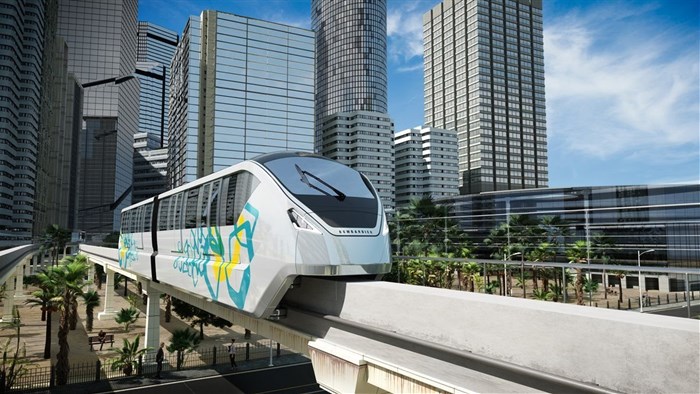In opening the 2019 Africa Investment Forum, President Cyril Ramaphosa in November remarked on Africa's severe infrastructure backlog. "Infrastructure is a vital driver of economic growth, and we have prioritised attracting infrastructure investment so we are able to achieve the socio-economic targets in Agenda 2063 and the United Nation's Sustainable Development Goals," the President said.

Image Supplied.
Central to a modern industrial economy – and one which fosters increased international investment and trade – is a high-functioning transport network.
And in South Africa, central to that is rail.
The World Bank predicts that over half of all Africans will be living in cities by 2040. Rail – and particularly, monorail, which is characterised by having a single rail as its sole support and guideway - has the potential to help support our burgeoning transport demands and to boost job creation and contribute towards poverty alleviation at the same time. In addition, a further shift towards rail could make a significant impact in the fight against climate change.
Tailored for rigorous urban service
Recently, Bombardier Transportation presented its monorail capabilities for the King Shaka International Airport, in Durban, to local government officials and His Majesty King Goodwill Zwelithini.
According to Stats SA’s 2019 mid-year population estimates, KwaZulu Natal is home to more than 11 million people.
And according to the KwaZulu Natal Tourism Authority’s Annual Report for the 2018 / 2019 financial year, the province receives as many as 3.7 million additional bodies – in the form of local and international tourists – a year. This is sure to increase in the next year or two.
The Bombardier driverless INNOVIA monorail 300 system - which we introduced to King Shaka International Airport in November 2019 – incorporates a range of different design and operational features that are tailored for rigorous urban service. These include full driverless automation, emergency evacuation walkways, high-speed guideway switching and bi-directional operation.
It is both fast and cost-effective to build and can transport in excess of 40,000 people an hour.
Developing this kind of rail infrastructure would make commuting faster, easier and safer for tourists and locals alike. It would also create new jobs as well as decrease traffic volumes on our roads and lessen our carbon footprint.
Incredible potential to catalyse job creation
With South Africa’s unemployment rate currently at around 29%, job creation is one of the most pressing and important challenges facing the country today.
Developing the local rail industry stimulates large-scale job creation across the entire value chain, both upstream and downstream.
Climate change
The industry also has the potential to make a meaningful impact in the fight against climate change – another of the most pressing and important challenges facing South Africa - and, indeed, the world - today.
Climate change and the impact and risk thereof continues to garner increased attention from big business, civil society and society at large,
In September 2019, we saw a wave of anti-climate change protests across the globe ahead of the UN Climate Action Summit, which took place in New York. As many as 7.6 million people in 150 different countries took part in what has since become known as the Global Climate Strike, part of the ‘school strike for climate’ movement which was inspired by Swedish climate activist Greta Thunberg.
Thousands of our own countrymen took to the streets during the Global Climate Strike to show their support for the cause and to raise awareness around climate change.
Monorails, by their nature, emit low levels of carbon and require less space. It has a high standard for environmentally sustainable rail transportation and features high energy efficiency and low greenhouse gas emissions. It can also be built using materials with high recyclability.
In 2018, the government announced its plans to spend R288 billion on upgrading the country’s transport network over the course of a three-year period and this is an investment that we, at Bombardier Transport, have publicly welcomed.
We also believe, though, that the private sector has a critical part to play in this space and that public-private partnerships are crucial. After all, we all have unique and important roles in driving the nation forward.














































